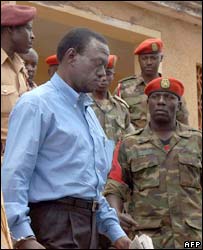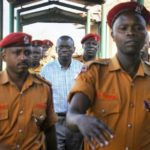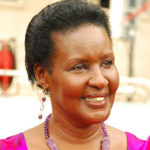
On Friday December 17, 2005, then opposition leader Rtd Col. Dr. Kizza Besigye wrote from Luzira Prison where he was remanded, replying President Yoweri Museveni about his (Besigye’s) arrest and trial. Museveni had said the Forum for Democratic Change (FDC) leader created the problems resulting in his arrest and that the government could only have principled and not opportunistic resolution of the situation.
Below is the letter from Luzira
Earlier, on December 11 President Yoweri Museveni had issued a statement saying Besigye is characteristic of his dishonesty.
- That the NRM (read Museveni) has been firm in dealing with wrongdoers: It is an indisputable fact that under the Museveni regime, ‘wrongdoers’ are not treated equally as demanded by the Constitution. In Uganda, there are three criminal Justice systems:
- a) One for Museveni loyalists.
- b) One for the general public.
- c) One for Museveni’s political opponents, imaginary or real.
Numerous commissions of inquiry have compiled evidence and recommended prosecution of senior military, public and political leaders. The Museveni loyalists, far from being arrested and prosecuted, have been promoted and praised for ‘liberating’ our country!
On the other hand, crimes have been invented for members of the political opposition, who are promptly arrested, tortured and detained for long periods before the DPP (Director of Public Prosecutions) ‘loses interest’ in the cases. Some people have been in prison for more than five years, without trial. My wife, Winnie Byanyima, was arrested three times, and the charges were either dropped or dismissed by Court. This is Museveni’s “firmness with wrongdoers”.
- Principled reconciliation: In Museveni’s world, “principled reconciliation” can only happen when the “wrongdoer first admits his/her mistake”. Obviously, he cannot understand that reconciliation is not about managing “wrongdoing”, but rather about managing opposed or conflicting situations towards an amicable solution. That is why reconciliation is usually managed by mediators or facilitators, who help the conflicting parties to appreciate each other’s position and to move towards a harmonious solution. Naturally, in the process of reconciliation, wrongdoing on either side may be found and accordingly managed; without losing the primary goal of creating a harmonious understanding known as ‘reconciliation’.
For that matter, the DPP, the Courts of Law and the Military Court Martial cannot be the appropriate agents for reconciliation. I advise President Museveni to seriously consider the statement by religious leaders of UJCC (Uganda Joint Christian Council) published in The Daily Monitor of December 14, 2005 and the offer they make.
- The cases of Kizza Besigye: When I came back to Uganda to face the so-called criminal charges against me, I did not ask or expect to be treated preferentially by the justice system or by anyone in authority in respect of the charges that have been preferred against me.
I only ask, and EXPECT to be treated fairly and in accordance with the law and its due process. As a matter of fact, I rejected ‘preferential treatment’, which came in the form of an offer by President Museveni, to remove me from prison “immediately” and put me under “house arrest” at my residence.
This was partly because I thought it was irregular and inevitably shrouded with many uncertainties. I also rejected Museveni’s preferential treatment that if I should sign amnesty papers, I would immediately be discharged of all my cases, including rape! The Government of Uganda knows that I have a significant team of lawyers who would be aware of the Amnesty Law. Why then, would it be the Government, the law enforcer, pressurizing me to apply for amnesty? Does President Museveni consider this a legitimate role of political leaders in handling criminal matters?
My concern and the concern of many people and organisations that have made public expressions are the following:
- Timing and management of my cases
- i) The cases I am charged with were allegedly committed between 1997 and 2003. Until November 14, 2005, no charges against me had ever been brought before any court, this in spite of the fact that I have publicly and repeatedly demanded over the past five years that if there were any charges against me, they should be put before court and that I was prepared to face the law. President Museveni’s letter to his Cabinet just before my return stated that “there were long-standing criminal charges that would be brought against” me if I came back, although the DPP had just denied any knowledge of impending cases against me.
- ii) The Uganda Government knew exactly where I was living in South Africa; if I was plotting to overthrow it, why wouldn’t they complain to the friendly government of South Africa. Indeed, shortly before my return to Uganda, President Museveni boasted that if his government needed me to answer any charges, they could easily ask for my extradition from South Africa. So why did he not arrange to extradite me, if I had “long-standing criminal charges” known to his government all those years?
- iii) My co-accused were arraigned in court more than a year ago. I only became part of their case on November 15, 2005. All this suggests that these cases were not managed transparently and in accordance with the established legal process. This concern is further accentuated by the fact that I was arrested while very busy doing political work in preparation for the oncoming presidential elections. Further, every effort has been made to deny me bail.
- Trial by Military Court Martial
Through our lawyers, we opposed trial by the Military Court Martial because:
- i) The UPDF Court Martial is not an independent and impartial court to which people have a constitutional right. It is really a service court intended to enhance discipline among errant, serving soldiers. It is therefore inherently not intended to be impartial because:
- It is headed by the Commander-in-Chief, who is the President.
- All the Court Martial members, including the prosecutor, are senior UPDF officers, appointed by the President and operating under his continuing and direct command. He deploys them, promotes them etc.
- It is to him that an aggrieved soldier appeals in case of delays of their trial, etc. There is therefore no way this court can be impartial to a person seeking to replace the President. Certainly, I would never willingly subject myself to the jurisdiction of the UPDF Court Martial and expect justice through it. On the other hand, I would be prepared to battle any number of charges in a civilian court.
- ii) We believe the Court Martial action was intended to defeat the ends of justice to deny us bail. This was precisely the reason for the “Black Mambas” abomination and why the High Court hearing of my bail application was delayed so that I could be charged and remanded by the Military Court Martial, first! If the military prosecutor had fresh evidence necessitating fresh charges, why couldn’t they just pass it on to the DPP to institute these further offences against me?
- iii) The Court Martial case is based on exactly the same facts as those for the treason case before the High Court. Therefore, we are being tried in two courts for the same alleged acts.
- iv) The Military Court Martial was established to regulate the discipline of soldiers, deriving authority from Article 210 of the Constitution. It is not right to try civilians who have nothing at all to do with UPDF under its court, more so, when it violates their fundamental right to appear before an independent court or tribunal.
- v) The Court Martial is not authorized to try the case of terrorism with which we have been charged in that court (that of illegal possession of firearms being an alternative charge). Section 6 of the Anti-terrorism Act, 2002 states as follows:
“The offense of terrorism and any other offences punishable by more than 10 years’ imprisonment under this Act are triable only by the High Court and bail in respect of those offences may be granted only by the High Court”.
It is for those reasons that we have petitioned the Constitutional Court and High Court for appropriate action.
President Museveni claims that the use of the Military Court Martial to try civilians has helped deal with crime since civil courts were overstretched. This assertion is an insult to Ugandans. Some people have been waiting in prison for over four years for their cases to be disposed of by the General Court Martial since 1999. From the information I have received while in prison, people who were arrested by Wembley and VCCU (Violent Crime Crack Unit) operations since 2002 are 560 people, of whom 448 have not yet been tried:
- 250 people are in Kigo Farm Prison.
- 130 people are in Luzira Upper Prison.
- 60 people are in Makindye Military Police cells.
- 98 people have been released on GCM bond after paying a bribe of between sh500,000 and sh2,500,000.
- 12 detainees have died in prisons, mainly from untreated torture injuries.
- Only 10 people have had their cases disposed of by the GCM.
The 440 people pending GCM trial, whose names and details I have compiled have been in prison for one to four years, yet Section 190 of the UPDF Act provides that a person triable under military law who has been detained in custody for 90 days before commencement of her/his trial shall be freed all the 440 illegally detained men have families; most with very young children.
These families have fallen into destitution as a result of the GCM, to which the President of Uganda is happy to divert cases from civil courts. Such is President Museveni’s sense of justice!
President Museveni is wrong. As a prisoner of conscience, I neither seek nor expect preferential treatment from him or from anybody else. I will willingly fight the political battle both politically and in the Civil Courts of Law, and I am confident that the truth will set me free, but I will never subject myself to his idea of “preferential treatment” or his dubious and impartial GCM.
I may be imprisoned but the political issues I have raised and my resolve to fight for freedom will never be imprisoned. Let’s all work to keep hope alive.
For God and my country.
No UR 898/05
Luzira Maximum Upper Prison







